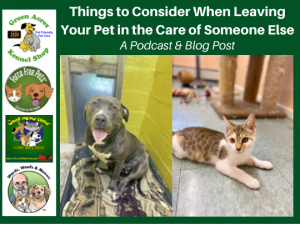 < A version of this article was published in the September 2021 issue of Downeast Dog News>
< A version of this article was published in the September 2021 issue of Downeast Dog News>
< Updated 07OCT21 >
< A short link for this page – https://bit.ly/BRD-Consider-1 >
< Click to listen to a companion podcast to this blog post >
Every year millions of dogs and cats of various breeds, sizes, and ages are cared for by boarding facilities, pet sitters, friends, and family members. This could be for multiple reasons: traveling for business or vacation, extended work schedules, or a family emergency or illness. While many pets, dogs, in particular, find a stay at a boarding facility fun, despite the best efforts of pet care professionals, not all pets do well away from home. When this occurs, a pet care professional is responsible for informing you of this situation; they want your pet to have a low-stress and enjoyable stay and go home happy and healthy. While many factors require consideration before boarding your pet, temperament, health, and age top the list.
work schedules, or a family emergency or illness. While many pets, dogs, in particular, find a stay at a boarding facility fun, despite the best efforts of pet care professionals, not all pets do well away from home. When this occurs, a pet care professional is responsible for informing you of this situation; they want your pet to have a low-stress and enjoyable stay and go home happy and healthy. While many factors require consideration before boarding your pet, temperament, health, and age top the list.
Most boarding facilities provide more comprehensive care for their guests than the typical hotel does for humans. That is why the process of booking a reservation for your pet is not as easy as booking a hotel room for yourself online. A reputable boarding facility will ask questions about your pet’s vaccinations, temperament, play style, health, food preferences, and medications. A boarding facility provides a place to rest and sleep but is also responsible for; meals, mental enrichment and play, housekeeping, physical handling, routine medication if needed, and sometimes grooming services. If a pet becomes unwell, those services may include transportation to the veterinarian. If you or your designated representative is not available, the boarding facility and their veterinarian may need to make medical decisions for your pet.
Your Pet’s Temperament
Just as people have a wide range of temperaments, so do pets. Some will be constantly happy and look forward to meeting every new, living thing they encounter. At the opposite extreme, some will dislike and even fear anything new and may never open up to other animals or people. Even a change in environment, such as moving from a familiar home to a boarding facility or home of a friend, whether filled with other critters and people or not, can be overwhelming for some pets.
A fearful pet is not a “bad” pet; they are just animals struggling in a difficult situation and require patience and understanding. Unfortunately, a frequently anxious or fearful pet is unlikely to enjoy being cared for anywhere outside of their home. No matter who cares for your pet, they must be able to handle them regardless of the pet’s mood. While any animal can have an intemperate moment and bite, pets that are fear aggressive are more likely to pose a bite risk. Therefore, they are probably not a good candidate for a boarding facility or a pet sitter. It is a pet parent’s responsibility to disclose this information and to find a suitable alternative.
A reputable professional may be able to work with you to help acclimate your pet to staying away from home. However, please be aware that this is a prolonged process and must start weeks, if not months, before leaving your pet.
Your Pet’s Health and Age
Most pets are relatively healthy during their younger years, but underlying health issues may arise as they age. It is essential to do a mental and physical assessment of your pet every time you board them to ensure that they are in good health. If, at any time, you have concerns, or are made aware of health issues by your veterinarian, contact your boarding facility and have a conversation with them regarding these issues. Concerns can be anything from increased water consumption or decreased appetite, hints of dementia, increased stiffness in joints, or reactivity and aggression. The boarding facility may suggest or even require that you have your pet examined by a veterinarian before boarding, but that is a better alternative to receiving a phone call and having to consult and make decisions over the phone while you are hours away
The boarding facility will need to be able to easily and quickly contact you at any time if something arises and emergency healthcare is necessary. If you will be unable to be reached while away, you need to have a friend, family member, or veterinarian designated to act on your pet’s behalf. They must be available and able to be reached quickly and easily. While a caregiver for your pet may have you sign a contract giving them authority to act in your pet’s best interest if you are unreachable, the preferred situation would always place you as the person in charge of any life-altering decisions regarding your pet. Illnesses can come on suddenly, and life and death decisions may need to be made quickly to prevent your pet from suffering. An alternative is to have your attorney draft a healthcare directive for your pet. If you choose this option, be sure that your pet’s caregiver and veterinarian have a copy.
While the boarding facility staff and pet sitters should be knowledgeable on pet first aid, common health issues, nutrition, pet play dynamics, and normal and abnormal pet behavior, they are not veterinarians. Therefore, if you or your veterinarian believe that your pet needs any of the following; continuous medical observation, the administration of an IV for medications or hydration, frequent temperature checks, physical assistance to relieve themselves, or wellness checks several times throughout the night, your pet will be best served by being at home in familiar surroundings or with their veterinarian or an individual with a similar level of knowledge and experience.
The owners and employees of pet care facilities are in the profession for their love of animals. However, there is nothing more difficult for them than to watch a pet suffer either emotionally or physically while in their care. Please help both them and your pet by maintaining an open line of communication regarding the care of your pet while you are away.
Recommended Resources
Articles on Don’s Blog
( http://www.words-woofs-meows.com )
Cat Behavior – Make Your Life Easier – Get Your Cat to Love Their Carrier – http://bit.ly/Cats-Carriers
Canine Behavior – Understanding, Identifying and Coping with Canine Stress – http://bit.ly/Canine-Stress
Please Be Cautious When Choosing Who Cares For Your Pets – http://blog.greenacreskennel.com/2016/04/11/pet-care-services-please-be-cautious-when-choosing-who-cares-for-your-pets/
Traveling – Do you take the dog along or leave him with someone? –http://blog.greenacreskennel.com/2016/04/11/traveling-do-you-take-the-dog-along-or-leave-him-with-someone/
Pet Care Options When You Go Away: Pet Sitter, Neighbor, Boarding Facility – http://blog.greenacreskennel.com/2015/09/01/pets-who-cares-for-them-when-you-are-away/
Selecting A Pet Care Provider – Yes! A Trend Towards Kinder and Gentler Professional Pet Care – Green Acres Kennel Shop’s “Pet-Friendly” Philosophy – Part 1 – http://blog.greenacreskennel.com/2015/04/02/yes-a-trend-towards-kinder-and-gentler-professional-pet-care-green-acres-kennel-shops-pet-friendly-philosophy-part-1/
 Podcasts from The Woof Meow Show
Podcasts from The Woof Meow Show
( http://woofmeowshow.libsyn.com/ )
Things to Consider When Leaving Your Pet in the Care of Someone Else –https://traffic.libsyn.com/secure/woofmeowshow/WoofMeowShow-2021-10-02-Things_to_Consider_When_Leaving_Your_Pet_in_the_Care_of_Someone_Else.mp3
Things To Consider When Boarding A Pet-Part 1 (2018) – http://blog.greenacreskennel.com/2018/07/08/podcast-things-to-consider-when-boarding-a-pet-part-1/
Things To Consider When Boarding A Pet-Part 2 – http://blog.greenacreskennel.com/2018/08/09/podcast-things-to-consider-when-boarding-a-pet-part-2/
________________________________________________________________________
Don Hanson is the co-owner of the Green Acres Kennel Shop ( greenacreskennel.com ) in Bangor, Maine, where he has been helping people with their pets since 1995. He is also the founder of ForceFreePets.com, an online educational resource for people with dogs and cats. Don is a Bach Foundation Registered Animal Practitioner (BFRAP), Certified Dog Behavior Consultant (CDBC), Associate Certified Cat Behavior Consultant (ACCBC), and a Certified Professional Dog Trainer (CPDT-KA). He is a member of the Pet Professional Guild (PPG). Don serves on the PPG Board of Directors and Steering Committee. In addition, he chairs the Advocacy Committee and The Shock-Free Coalition ( shockfree.org ). Don produces and co-hosts a weekly radio show and podcast, The Woof Meow Show, that airs on Z62 Retro Radio WZON (AM620) and WKIT 103.3-HD3 and is streamed at http://bit.ly/AM620-WZON every Saturday at 9 AM. Podcasts of the show are available at http://bit.ly/WfMwPodcasts/, the Apple Podcast app, and Don’s blog: www.words-woofs-meows.com. The opinions in this post are those of Don Hanson.
©07OCT21, Donald J. Hanson, All Rights Reserved
< Click for Copyright and Use Policy >